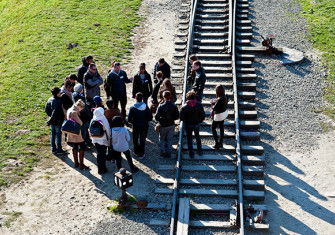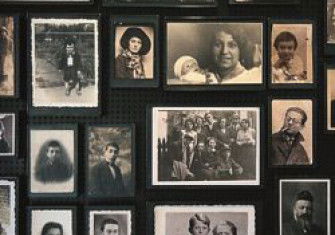The Holocaust and the Unknowable Past
Paul Lay recounts a trip to the site of Treblinka.
 Almost 30 years ago I travelled deep into eastern Poland and visited the site of Treblinka, the extermination camp where, between July 1942 and the desperate uprising by prisoners in August 1943, more than 800,000 people – perhaps many more – were murdered during Aktion Reinhard, the Nazi plan to eliminate the Jews of the General Government. It is, by a distance, the worst place I have ever been: a remote and desolate clearing within a thick forest, now marked with hundreds of menhir-like stones inscribed with the names of the places from where the victims came. I remember that there were few other people around and that the weather was grim, though it was early summer. Perhaps one remembers the weather as it should have been rather than as it was.
Almost 30 years ago I travelled deep into eastern Poland and visited the site of Treblinka, the extermination camp where, between July 1942 and the desperate uprising by prisoners in August 1943, more than 800,000 people – perhaps many more – were murdered during Aktion Reinhard, the Nazi plan to eliminate the Jews of the General Government. It is, by a distance, the worst place I have ever been: a remote and desolate clearing within a thick forest, now marked with hundreds of menhir-like stones inscribed with the names of the places from where the victims came. I remember that there were few other people around and that the weather was grim, though it was early summer. Perhaps one remembers the weather as it should have been rather than as it was.
What was the value of that visit? What did I learn? Those are questions I considered again after reading a thoughtful piece by the Observer journalist Catherine Bennett, published in August, which questioned the value of the kind of visits promoted by the wholly admirable Holocaust Educational Trust, whose Lessons from Auschwitz programme, which includes a day visit to Auschwitz-Birkenau, is increasingly popular with British schools. But is seeing a concentration camp or the blasted ground of an extermination camp more valuable, more illuminating than reading about it or watching a film about the Holocaust?
Visiting Treblinka was so overwhelming that I felt numb and my understanding of what happened there has since been informed far more by studies of the Holocaust and, above all, by Claude Lanzmann’s great documentary, Shoah, in particular the astonishing sequence in which he interviews Franz Suchomel, a former SS junior sergeant, who describes in precise, pathological detail the process of mass murder before singing the song that prisoners learned on their arrival. Every serious student of history should watch Shoah, as they should engage with the testimony of Kalman Teigman, one of very few Jewish survivors of Treblinka. Reading his words, hearing his voice, one understands more than one can ever see:
It was hell, absolute hell. A normal man cannot imagine how a living person could have lived through it – killers, natural-born killers, who without a trace of remorse just murdered every little thing.
There are things that remain beyond human imagining and it is more important surely to comprehend how such abominations as the Holocaust can arise than to see their effects, though there is value in that, too. Next year, as part of the commemorations of the First World War, two pupils from every state secondary school in Britain will visit the graves of the Western Front. Will those selected to traipse the now peaceful, manicured fields of Flanders understand the realities of trench warfare more than, say, those who read the work of historians such as Hew Strachan or the writings of Ernst Jünger, Robert Graves and others who knew first-hand what it was to go over the top?






